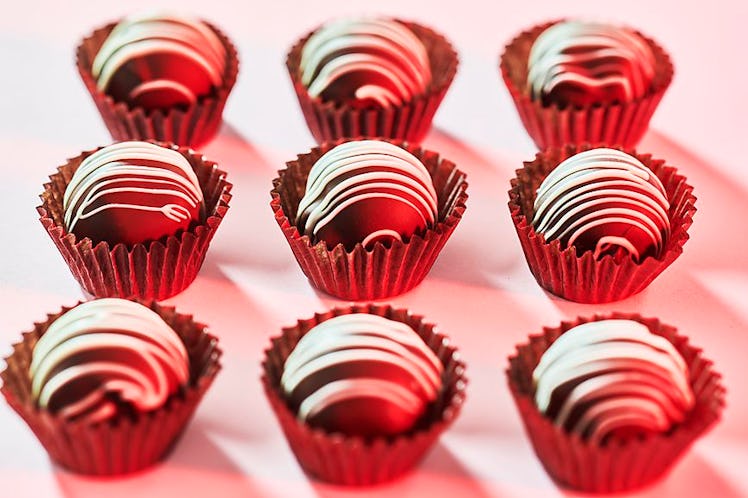Few things go together like chocolate and Valentine's Day. It's true: Giving and receiving chocolate has become one of the most popular ways to commemorate the day of love. And while I think I speak for pretty much everyone when I say that no one is complaining, that doesn't stop us from wondering why we give chocolate on Valentine's Day. It's a valid question, considering the amount of people who are quick to take those big chocolate hearts for granted.
But then again, it's pretty impossible to ignore the 58 million pounds of chocolate purchased during Valentine's Day week alone, according to History.com. And I truly struggle to imagine a world in which anyone in their right mind would refuse a beautifully wrapped box of decadent cocoa morsels. Clearly, we all love it. We all expect it come Valentine's Day. But... why chocolate?
Well, first, let's not forget the science behind everything. We've all heard the talk about the too-good-to-be-true super powers wielded by the cocoa bean. According to Forbes, chocolate has been proven to be good for the heart, improve cognitive function, and is surprisingly nutrient-rich. Oh, and let's not forget the theory that dark chocolate might also make you horny? (Although, researchers have said not to count on this.)
If you thought that the connection between love and chocolate was a fairly new one, not so fast. The first recorded link between chocolate and desire dates all the way back to the Aztecs. According to The New York Times, the infamous emperor Montezuma was rumored to have popped cocoa beans like M&Ms in order to "fuel his romantic trysts."
As mentioned early, researchers aren't sold on the aphrodisiac qualities of chocolate. While chocolate does contain tryptophan and phenylethylamine, two chemicals that affect the brain's pleasure and reward centers, most scientists agree that the amount of these chemicals present in chocolate is too little to have any marked effect on desire.
Fast-forward to the Victorian era in England, where society was still drawing connections between chocolate, love, and seduction. According to The Independent, a "19th-century commentator" observed that it was almost instinctual that men knew chocolate was the way to someone's heart.
And it's not a bad sentiment, folks. This also gave men the opportunity to demonstrate their taste and expertise when it came to choosing "the right" box for the particular woman they were trying to woo, according to The Independent. And as advertisers of the times continued to reinforce the connection between chocolate and love, The Independent also notes that Victorian etiquette books even went as far as to warn women against accepting a box of chocolates from someone they weren't engaged to.
Thankfully, the etiquette rules when it comes to accepting decadent sweets have definitely chilled out since then. Haven't we all been guilty of accepting a tasty treat or two from an admirer we might not have been all that interested in? Because why not?
Although, the relationship between chocolate and desire has yet to be backed up by science, at the very least, we know that the health benefits of dark chocolate are real for the most part. And let's be honest: The power of suggestion can also be pretty real. At the end of the day, the history of chocolate as it relates to love is so deeply ingrained in numerous iterations throughout the past, and since I've yet to hear any real objections, I'm sure most of us are more than happy to keep it that way.
Check out the entire Gen Why series and other videos on Facebook and the Bustle app across Apple TV, Roku, and Amazon Fire TV.
Check out the “Best of Elite Daily” stream in the Bustle App for more stories just like this!
